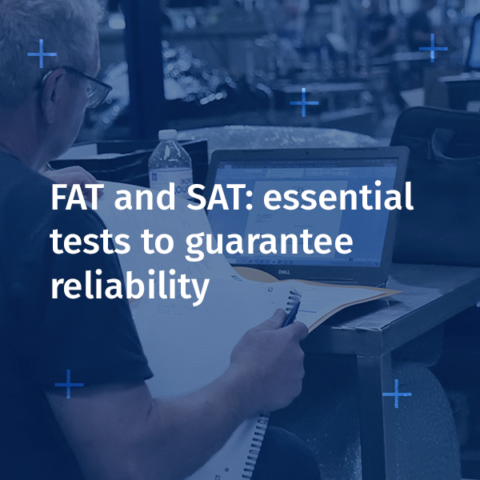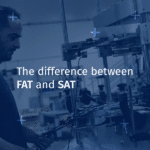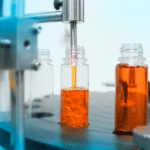At CDA USA, we are committed to delivering robust solutions tailored to each client’s needs. To achieve this, we’ve incorporated two essential testing procedures into our process: the FAT (Factory Acceptance Test) and the SAT (Site Acceptance Test).
Whether it’s a filling machine, capper, labeller, or monobloc system, each unit undergoes real-world testing to ensure maximum performance.
The difference between FAT and SAT
The FAT is conducted in our workshop. It’s a full-scale test prior to shipping, verifying that the machine meets the client’s technical expectations. It covers production speed, dosing accuracy, labelling system performance, and compatibility with caps, lids, or closures.
The SAT, on the other hand, takes place at the customer’s premises once the machine is installed. It evaluates how the equipment behaves in the final production environment, where factors like temperature, humidity, product emissions or uneven flooring can impact performance.
Why are these tests essential?
These technical verifications are much more than a formality. They allow for:
- Tailored functional validation : the machine is tested using the client’s own packaging, products and consumables
- Reduced risk : anomalies are corrected before delivery, avoiding downtime
- Time saved during installation : initial adjustments are made in advance
- Reliable start-up : the machine arrives ready to operate without surprises
Rigorous Testing in Our Workshop
For every FAT, CDA uses real samples provided by the customer – bottles, caps, labels and the final product. This allows us to simulate actual production configurations.
Our technical teams verify:
- Production speeds
- Filling accuracy (for fillers)
- Torque and capping precision (for cappers)
- Labelling precision (for labellers)
Three FAT Examples
- K-Net Auto : A fully automatic filling machine ideal for liquids and semi-viscous products. During FAT, we check dosing stability, flow rate per nozzle and auto-cleaning functions.
- VST : An automatic capper frequently used with T-corks, typical in the spirits industry. It’s tested for correct cap positioning, format tolerance, and consistent tightening.
- Ninon Mix : A multi-format labeller designed for various container shapes. During FAT, we test multiple format settings, sensor responsiveness, label placement stability, and seamless format changeovers.
SAT: Final on-site validation
Once installed, the SAT enables:
- Verification of integration into the customer’s production line
- Adjustment of parameters to real-world conditions
- Operator training on usage and maintenance
- A quick and confident handover to production teams
This step is also the opportunity to fine-tune details and ensure the machine is fully operational in its new environment.
More than a test: building a trusted relationship
FAT and SAT are also key moments of technical and human interaction. They enable us to:
- Listen to end users
- Adapt the machine to real production routines
- Strengthen collaboration between CDA teams and customers
With CDA, you benefit from thoroughly tested packaging machines, fully adjusted and ready to perform. All our fillers, cappers, and labellers go through this dual FAT/SAT process, ensuring performance and long-term reliability.







